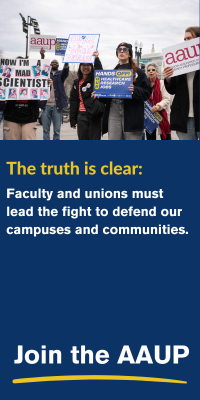- About
- Programs
- Issues
- Academic Freedom
- Political Attacks on Higher Education
- Resources on Collective Bargaining
- Shared Governance
- Campus Protests
- Faculty Compensation
- Racial Justice
- Diversity in Higher Ed
- Financial Crisis
- Privatization and OPMs
- Contingent Faculty Positions
- Tenure
- Workplace Issues
- Gender and Sexuality in Higher Ed
- Targeted Harassment
- Intellectual Property & Copyright
- Civility
- The Family and Medical Leave Act
- Pregnancy in the Academy
- Publications
- Data
- News
- Membership
- Chapters
New Statement on Academic Boycotts
Committee A on Academic Freedom and Tenure voted at its July meeting to approve the Statement on Academic Boycotts, which was adopted by the Council and published online in August. The statement reconsiders Committee A’s prior, categorical opposition to academic boycotts set forth in the 2006 report On Academic Boycotts. It maintains that academic boycotts are not in themselves violations of academic freedom, and that they can instead be “legitimate tactical responses to conditions that are fundamentally incompatible with the mission of higher education.” The statement “recognizes that when faculty members choose to support academic boycotts, they can legitimately seek to protect and advance the academic freedom and fundamental rights of colleagues and students who are living and working under circumstances that violate that freedom and one or more of those rights.” It concludes that “individual faculty members and students should be free to weigh, assess, and debate the specific circumstances giving rise to calls for systematic academic boycotts and to make their own choices regarding their participation in them.” Further, it holds that a faculty member’s choice to support or oppose an academic boycott should not itself be the basis for formal reprisal. The statement reiterates that “academic boycotts should neither involve any political or religious litmus tests nor target individual scholars and teachers engaged in ordinary academic practices, such as publishing scholarship, delivering lectures and conference presentations, or participating in research collaborations.” “Academic boycotts,” the statement concludes, “should target only institutions of higher education that themselves violate academic freedom or the fundamental rights upon which academic freedom depends.”
The “State of the Profession” column in this issue discusses the new Statement on Academic Boycotts in greater detail.



